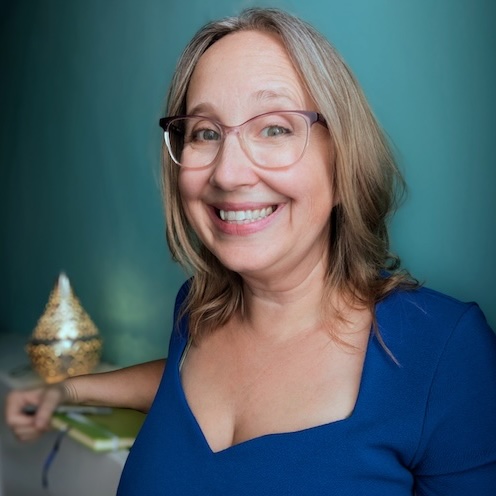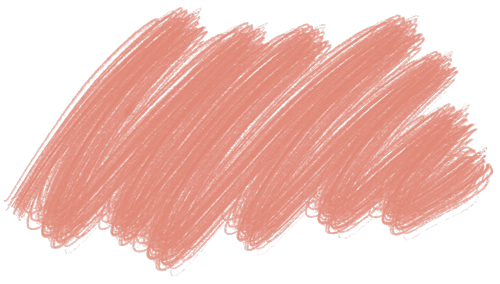
Revision Love Course
Learn to edit your writing in this five-week course.
Next Session: February 22 to March 29, 2026
Become your best editor
Become a skillful editor of your own writing, with helpful assignments from an author and a literary magazine editor (that’s me!). Gain confidence as you bring your revision skills—and writing career—to the next level.

Is this you?
If revision has ever felt like just shifting words around without real progress, this course will change that. You’ll learn to revise with clarity, confidence, and a proven process. This course is for you if:
- You feel stuck in revision.
- You avoid taking a piece apart because you’re unsure how to put it back together.
- You struggle to decide which feedback to follow after a critique.
- You need motivation to return to your drafts and see them through.
Make Your Words Shine!
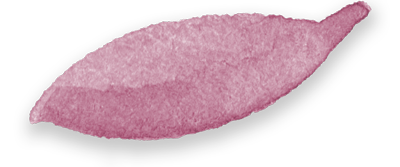
After Revision Love...
- You’ll confidently edit your own writing.
- You’ll have fifteen concrete strategies to improve your work.
- You’ll know how to give and receive meaningful feedback.
- Your writing will be ready for publication.
Hi, I'm rachel Thompson
I am a literary magazine editor (with Room), a published author, and the host of the Write, Publish, and Shine Podcast.
Early in my writing journey, I struggled with revision too. I knew something wasn’t quite right in my drafts, but I wasn’t sure how to fix them. Over the years, I developed a revision approach that finally clicked—one that recognizes what’s working while making meaningful changes. That’s what I want to share with you in this course.
I feel like the lessons were built for me. I have so many ideas, revelations, and a lot of clarity about my writing now.
The fact that Rachel is an editor as well as writer, felt like she was qualified from a unique and valuable perspective. The revision techniques I learned in the course has helped me challenge myself more, and I’m more confident as I write my stories.
I was able to put on my revision hat on as I worked through a piece that I’m surprised and delighted to say won first place in the Prairie Fire CNF contest.
During the course, I was able to polish and organize a chapbook manuscript and it was shortlisted for Quattro’s Best New Canadian Poets contest!
Revision Love Student Stories
How Lacey went from frozen to finding the way through her novel revision.

Lacey Yong was at the start of her writing journey, navigating major life changes.
“I had just moved back to Canada from London, UK, and suffered a serious illness. In the wake of these challenges, I decided to pursue my dream of being a writer.”
Encouraged by an acceptance from a literary magazine, she dove headfirst into drafting her first novel.
“I began writing creative nonfiction, and the second piece I ever wrote was accepted for publication by Prairie Fire. Then, I completed the first draft of my novel in a whirlwind seven weeks.”
But when it came to revision, she froze.
“The length of the manuscript and the prospect of correcting each problem I saw was overwhelming.
I tried outlining. I tried reading blog posts on revision. I tried forcing myself to revise every day and berating myself when I failed. No matter what I did, the magic of the initial creation was gone, and all I succeeded in doing was exhausting myself.
I was also writing in isolation, without a community to talk to about my struggles.”
She wasn’t sure how to move forward.
“I struggled to understand what revision is (and what it isn’t!) and how to transform it into a systematic approach that would help me make measurable progress on my manuscript.”
Then, she found Revision Love—and a way into revising that felt unexpectedly joyful.
“One of the most valuable things Revision Love gave me was a reliable starting point. Every time I revise a chapter, I begin with the gems in the way that Rachel taught me. It was a revelation to learn that revision doesn’t always have to be painful and that it can be as generative as the first draft.
Focusing on what is working, rather than the ‘problems,’ changed everything for me.”
Now, with the course behind her, she says, “The future feels very hopeful to me.”
“Revising a novel is like creeping around in the dark: you move slowly, hoping you’re headed in the right direction. However, thanks to Revision Love, I have a candle to guide me.
I have returned to revising my novel with a renewed sense of purpose. There are days when it is still hard, but speaking with Rachel and connecting with the community she has created reminds me that I have to forgive myself when I think I am falling short—and keep going.”
Her advice to other writers?
“Take Revision Love! Rachel’s kind and wise instruction, her asynchronous learning format, and the beautiful group of writers she attracts will keep you going through the darkest nights of the soul.”
And that hopeful future she envisioned? It became reality. Lacey now has an agent for her novel and is well on her way to finishing her second book.
How Mridula learned to polish her precious words.
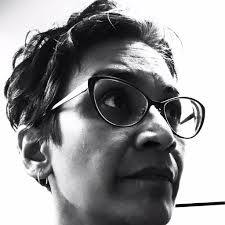
Mridula Morgan has loved words for as long as she can remember.
“Raised by a grandmother and mother who both taught in Catholic schools in India, I fell in love with words quite early. Reading and writing are akin to inhaling and exhaling to me—I need them to survive.”
But as the years passed, writing became more challenging.
“While it was easy to write stories growing up—winning second place in a poetry contest along the way—creative writing in adulthood has been increasingly difficult. I blame it on that elusive creature ‘time’—I don’t have enough of it because _______.”
With this sense of urgency, everything she wrote felt precious—too precious to revise.
“Every word I manage to squeeze out feels like an accomplishment, and I feel quite protective of it. I believe it is vitally important and thus nearly impossible to cut out words, as I generally tend to write about issues that mirror my identity as a cis settler of colour and speak to issues of oppression and living at/on borders.”
She knew revision was necessary to publish her work—but she wasn’t sure how to approach it.
“Shitty first drafts, I’ve learned, are meant to be re-sculpted. After putting aside first drafts for a day or two, I’d go back, re-read, pull out a sentence, add a word, move a paragraph—then sit back with satisfaction, thinking I’d edited my draft. And still, nothing felt worthy of submission.”
That changed when she took Revision Love.
“Each lesson offered insight into how I might get under the surface of what was on the page. Nearly every lesson, complete with worksheets and assignments, offered new content on the craft of revising. I’d never considered beginning to dissect from the middle of the piece or how vital it can be to balance form, mood, and senses.”
At first, the weekly pace felt daunting. But soon, she found it helped her stay focused and generate new ideas.
“I’d examine a piece and imagine how it could be redesigned with new ideas and insights.”
Even after completing the course, she still returns to the lessons.
“I often refer to the lessons when I’m working on a piece that needs attention. The examples offered and questions posed, balanced with my own changing life experience, support me in reimagining pieces for publication.”
Her advice to other writers?
“If you’re writing, then you will undoubtedly be editing and refining your work. I’d highly recommend investing in Revision Love to grow your ‘writing toolbox’ during this process.”
How Kate Went from Having Doubts About Her Writing To Making Business Cards That Say: I’m a Writer!
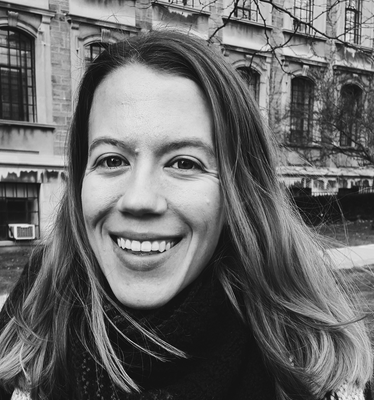
Before taking Revision Love, Kate felt alone in her writing process.
“I moved to Toronto two years ago, but I still feel like I’m struggling to find my people. Finding a network of writers to help me with my revision process has probably been the hardest thing for me because I have social anxiety.”
Self-doubt often clouded her revisions.
“There’s always the feeling with revision that I’m just kinda moving things around and changing things, but I don’t know if I’m actually making it any better—or just making it different, or maybe even making it worse!”
She constantly wondered: Am I just being a perfectionist, or am I changing things recklessly without improving them?
Being completely isolated in her revision made those feelings worse. She read books and blog posts about revision, but nothing quite replaced having real conversations about her actual work.
“In the course, I had people to talk to. I could say, ‘Here’s what I’m actually going through—how do I fix this one issue in my story?’ Instead of just reading generic advice, I got specific insights that applied to my writing.”
Before signing up, she was nervous.
“But then, getting into the course, I realized I wasn’t the little baby bird writer where everybody else was better than me and wouldn’t take my work seriously. I saw that other people were struggling with the same revision issues I was.”
By the end of the course, Kate felt more confident.
“I feel more confident because I have tools that can help me when I get stuck.”
And she put those tools to use right away. Not long after completing Revision Love, she:
– Finished the first draft of her novel (325 pages!)
– Revised a second draft
– Joined a writers’ group dedicated to her genre
– Submitted segments of her novel to literary magazines—18 times!
– Placed as a runner-up in The Puritan’s contest and was shortlisted for the Cambridge Short Story Prize for a piece she revised during the course
“Having a step-by-step plan for revision helps me overcome that gut-sinking feeling of oh gosh, now I have to revise this thing. Having this toolkit makes revision less daunting, which means I’m more eager to sit down and do it, and less likely to let fear and discouragement keep me away from my desk.”
And now?
“I feel really good about the future of my writing, and a lot of that came from the course—helping me feel prepared and ready and like I’m actually a real writer.”
(She even made business cards to hand out at writing events to connect with other writers!)
Revision Love Course Details
WHAT’S IN THE COURSE?
There are fifteen lessons to help you develop the self-editing skills you need to make your writing shine.
Weekly Schedule
The course runs for five weeks, with three lessons each week. Each lesson includes concrete, detailed assignments. Plan to set aside 2–3 hours per week to complete the assignments, which are due weekly to receive feedback.
Personalized Feedback
Each week, you’ll submit a piece for feedback, and I’ll provide detailed, constructive notes that highlight both strengths and areas for growth. My goal is to help you recognize what’s working while guiding you toward revision strategies that bring out the best in your writing. You’ll receive personalized feedback that considers your unique voice and style.
In addition to my detailed comments, you’ll have the opportunity to ask questions and get clarification on my feedback, ensuring that you feel confident about your next revision steps.
To keep feedback personalized, the course is limited to 12 participants—join us if it feels like the right fit for you!
Course Price
Payment information:
Pay Once
Pay in full oncePayment Plan
Pay in five monthly installmentsSliding-Scale Pricing
I offer sliding scale pricing options to provide more access for writers who need this.
Support Tier 1 (15% price reduction) For recently unemployed writers or writers experiencing reduced income and who do not have access to generational or personal wealth. Join Tier 1
Support Tier 2 (25% price reduction)
For writers who are experiencing financial insecurity and who also do not have access to personal or generational wealth and/or savings. Join Tier 2
ACCESS (30% price reduction)
Exclusively for writers on disability assistance or who are part of BIPOC and/or trans communities. If you are able, please choose another pricing level. Join Access
Need More Info?
Here is an Outline of the Course Curriculum…
Lesson 1 – Openings
Craft an opening that hooks your readers and compels them to keep going.
Lesson 2 – Endings
Discover fresh ways to close your piece with impact and insight.
Lesson 3 – Structure
Assess and refine your work’s structure for maximum effect.
Lesson 4 – Finding the Energy
Identify where your writing has momentum—and where it needs a boost.
Lesson 5 – Character & Setting
Deepen your connection to your characters and the world they inhabit.
Lesson 6 – Research
Enrich your work with meaningful details through research.
Lesson 7 – Making Sense
Clarify causality in narratives and enhance meaning in poetry.
Lesson 8 – Getting Specific
Use precise, concrete language to draw readers in.
Lesson 9 – Simplifying Language
Tighten and refine your sentences or stanzas for clarity.
Lesson 10 – Bringing Balance
Step back and see the bigger picture of your work.
Lesson 11 – Change
Map and amplify the evolution within your writing.
Lesson 12 – Emotional Resonance
Write so that readers don’t just understand but feel your work.
Lesson 13 – Audience
Think critically about your readers and revise with them in mind.
Lesson 14 – Finding Theme
Identify the deeper themes that give your work meaning.
Lesson 15 – Titles
Generate strong title options that reflect the heart of your piece.
I want you to feel confident about investing in this course. That’s why you’ll have lifetime access to all course materials—so you can revisit lessons anytime your writing needs a revision boost.
Frequently Asked Questions
What writing do I need to have prepared?
Ideally you would have a complete draft of creative nonfiction, fiction, poetry, or mixed-genre writing prepared. Don’t worry if it’s not “there” yet—that’s exactly what we’re going to work on in the course! You’ll get the most from the course when you apply the lessons to a draft you’ve already revised a couple of times on your own. Also note that many writers have found the course helped them with longer works like chapters in books or chapbooks.
Will I receive feedback on my writing and work in the course?
Yes! I give feedback on each assignment in the course. Each week, three assignments are due. I also answer questions about the assignments, your writing, and revision in our private community channel.
How Long is the Course?
Each session of the course runs for five weeks and writers work at their own schedule, with lots of personal feedback.
When does the course start and end?
The course session starts on April 6 and ends on May 11, 2025. Each course session runs for five weeks and writers can work according to their schedule, with specific deadlines to submit their writing for my feedback.
When Do We meet?
We have three course calls that offer a chance to dive deeper into a lesson and ask me questions live. These calls are scheduled at key points during the course. Video replays are available, so you can watch them anytime and bring additional questions to our community Slack channel.
That said, not every writer wants to attend a live call, so please note that most of our interaction happens in the community Slack channel, where you can ask questions, receive feedback, and get ongoing support throughout the course.
How much time do I need to have available?
It’s up to you and how much time you want to invest in your revision. There are weekly deadlines to help you stay on track, but we can work together to create a plan that fits your schedule. Many writers set aside 2–3 hours per week, while others take a week off and adjust their time to 3–4 hours per week over the remaining four weeks.
How big is the course cohort?
To provide a more personalized and supportive experience, I cap the course at 12 participants. This group size allows me to offer individualized attention, and writers benefit from detailed feedback on their writing.
Together, we create a space where you can comfortably engage and grow as a writer. I do this in particular for my fellow introverts, to ensure that every voice is heard and valued.
Since spaces are limited, secure your spot soon if you’d like to join my intimate and tailored course experience.
I can't make this session. When's the next one?
I will not offer Revision Love again until Spring 2026.
Why are your courses priced in USD?
Because my courses welcome writers worldwide, pricing in USD keeps things simple and consistent. Though I’m Canadian, I don’t live in Canada—but even when I did, I charged in USD since most of my course expenses, including those from Canadian providers, are billed in USD.
That said, I know the exchange rate can be tough for Canadians right now. I offer several ways to make my courses more accessible:
-
Sliding Scale Pricing – Discounts of 15%, 25%, or 30% for those with financial barriers
-
Installment Plans – Spread out payments over multiple months
-
Early-Bird Pricing – Lower rates, announced to my email list when enrollment opens
-
Lower-Priced Courses – I’ve recently lowered my overall course prices and offer courses at different price points.
-
CAD Billing Option – Some students have asked to be billed directly in CAD at the current exchange rate, and I’m happy to make this accommodation. Just reach out if this would work better for you.
If you have any other questions, feel free to get in touch—I’m happy to connect with you.
Do you offer a sliding scale for lower-income writers?
Yes. I offer a sliding-scale rate for writers experiencing unemployment/income loss, and financial insecurity. I also offer access pricing for writers on disability assistance or who are part of BIPOC and/or trans communities.
Am I ready to take this step for my writing?
You read all the FAQs and made it to the bottom of this LONG page, so I think you answered your own question. (Yes!)
Still Have Questions? ask me about revision love:
Rachel deeply cares about helping emerging and established writers. She believes in building and cultivating writing communities—spaces for writers to meet, share work, get feedback, and grow.

